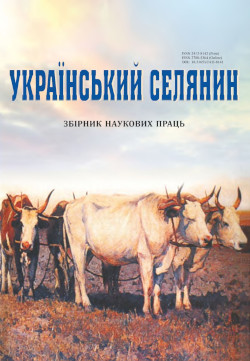Phenomenology of the Ukrainian peasantry in the conditions of soviet modernization: the problem feminism in mentality
Main Article Content
Abstract
Abstract. This article aims to deepen scholarly understanding of the causes, nature, and consequences of Soviet (Stalinist)
modernization of Ukrainian rural society through the lens of the phenomenological approach.
The scientific novelty of this study lies in considering key characteristics of the peasant mentality when analyzing the
complex processes of Soviet (Stalinist) rural modernization. Among these characteristics, the author highlights feminine
principle in mentality, which, within the historical processes shaping people’s thinking and behavior, manifests as the phenomenon
of executive circles. Ultimately, in the 1920s–1930s, Ukrainian peasants rapidly became Soviet citizens (collective
farm members). However, their «dual identity» signified the preservation of feminism circles that were not dismantled by
bolshevik rule. Under favorable conditions, these circles not only allowed for the retention of Ukrainian identity but also
contributed to its assertion.
The methodological framework of this study is based on an interdisciplinary approach, which enables a more productive
application of the theoretical foundations of cultural-historical synthesis to analyze the mental aspects of Ukrainian peasants’
social behavior under Soviet modernization.
Conclusions. The nomenklatura, which gained real power in Ukraine with the establishment of the Bolshevik regime and
acted as the initiator, organizer, and executor of peasant modernization, remained alien to the peasantry. In the 1920s–1930s,
it actively dismantled the foundations of traditional rural society. This process was so radical and simultaneously so veiled
that it was often difficult to distinguish declared progressive (modernist) changes from the methods of «high modernism»,
characterized by its drive to reshape reality according to ideological abstraction, as well as its extremism and brutality. This
complex process was also influenced by the internal (latent) world of the peasantry, which remained largely unnoticed by
contemporaries. One of its systemic features was femininity (circles of femininity), which, alongside other mental phenomena,
determined the trajectory of the existence and survival of Ukrainians as a distinct rural social group under extreme conditions.
When combined with other systemic characteristics, it «normalized» relations with the Bolsheviks and their policies. However,
historically, this compromise could not last indefinitely.
Article Details

This work is licensed under a Creative Commons Attribution 4.0 International License.
References
«Nezruchnyi klas» u modernizatsiinykh proiektakh (2010). Ukraina moderna (Bezmezhne selo). [«Inconvenient
Class» in Modernization Projects. Modern Ukraine (Boundless village)]. Kyiv. 6, 9–44. [in Ukrainian].
Donchenko, O., Romanenko, Yu. (2001). Archetypy soctsialnoho zhyttia і polityka. (Hlybynni rehuliatyvy
psychopolitychnoho povsiakdennia). [Archetypes of social life and politics (Deep regulations of psychopolitical
everyday life)]. Kyiv : Lybid [in Ukrainian].
Graziosi, А. (2004–2005). The Soviet 1931–1933 Famines and the Ukrainian Holodomor : Is a New
Interpretation Possible, and What Would Its Consequences Be? Harvard Ukrainian Studies. 27, 1/4, 97–115. [in
English].
Hoichenko, D. (2012). Krasnyy apokalipsis : skvoz raskulachivaniye i golodomor: memuaryi svidyetyelya
[Red apocalypse : through dekulakization and Holodomor: memoirs of a witness]. Kyiv : A-BA-BA-HA-LAMA-
HA. [in Russian].
Istoriografiia ukrainskoi etnomentalnosti (2021). V. B. Antonovych : istoriosofski narysy [Historiography
of Ukrainian ethno-mentality: V. B. Antonovych: historiosophical essays]. Kyiv : Vyshcha shkola. [in Ukrainian].
Radianska modernizatsiia [Soviet modernizatio]. Retrieved from https://vseosvita.ua/library/embed/
x-e805.docx.html (data zvernennia : 12.03.2025). [in Ukrainian].
Stradnyky na svoii zemli (2013). Spohady Lidy Prysiazhniuk riznykh rokiv [Sufferers in their own land.
Memories of Lida Prysyazhnyuk from different years]. Cherkasy. Vertykal. [in Ukrainian].
Tradytsiine suspilstva ta etapy yoho rozvytku. [Traditional society and stages of its development]. Retrieved
from https://studfile.net/preview/16481072/page:33/ (data zvernennia : 29.03.2025). [in Ukrainian].
Tymoshyk, M. (2017). Selo : 2. 2. Trudnyi shliakh vidmoskovlennia [Village : In 2 volumes. 2 : The difficult
path of de-Moscowization]. Kyiv : Yaroslaviv Val. [in Ukrainian].
Vsetecka, J. (2021). Toward a Social History of the Holodomor and its Aftermath: Famine Survivor Testimonies
in the Archive of the US Commission on the Ukraine Famine. Ukraina Moderna. 30–31, 59–79. [in English].
Weber, M. (2018). Protestantska etyka і dukh kapitalizmu. [The Protestant Ethic and the Spirit of Capitalism].
Kyiv : Osnovu [in Ukrainian].
Wilson, A. (2004). Ukraintsi : nespodivana natsiia. [The Ukrainians : Unexpected Nation]. Кyiv : К.І.S.
[in Ukrainian].

